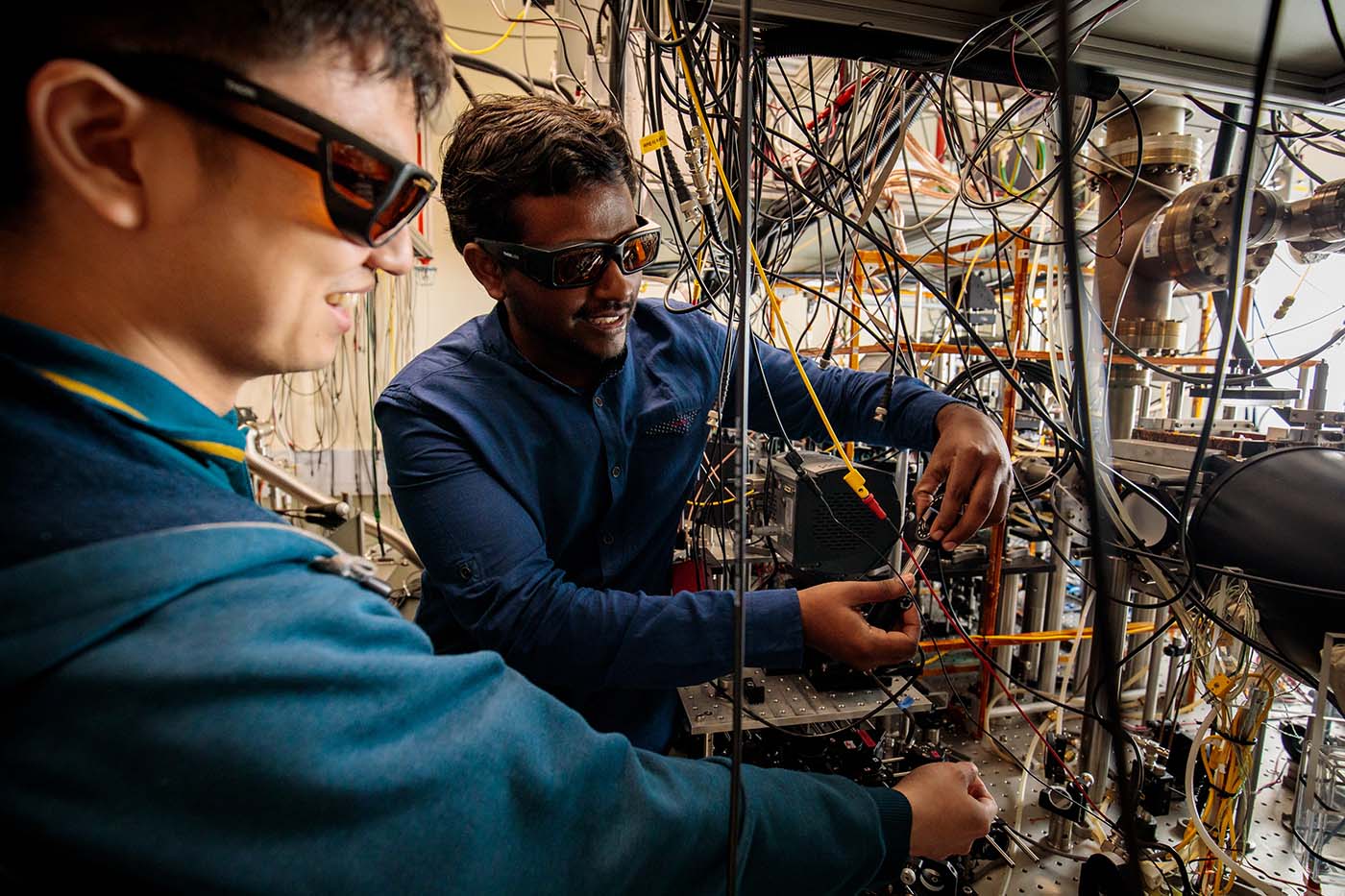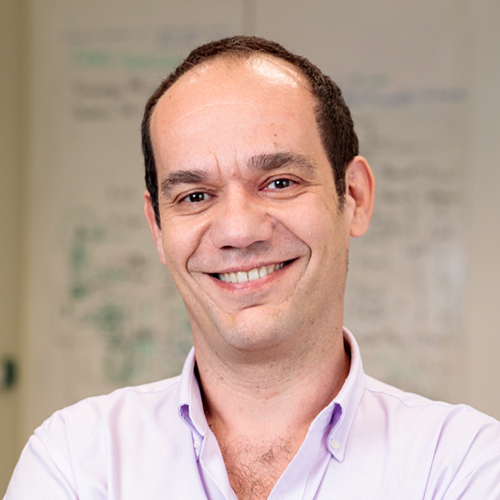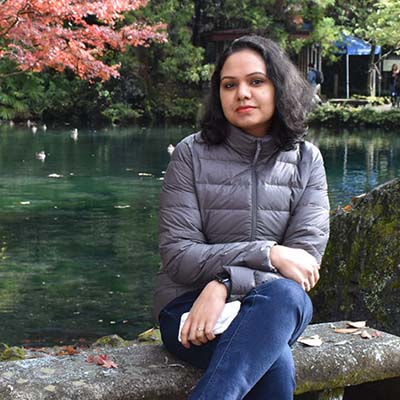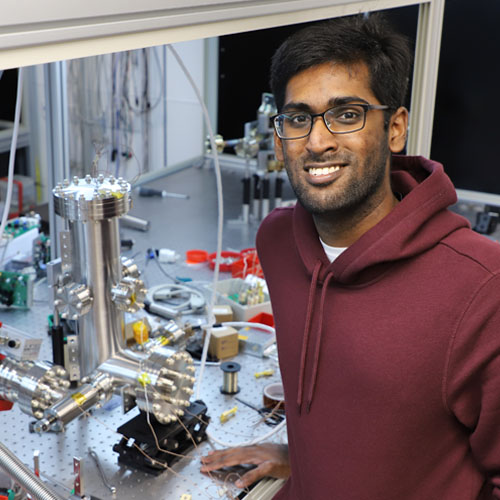Highlights
Meet a CQTian: Chetan Sriram Madasu
 During his undergraduate studies, Chetan (back) was driven by scientific curiosity to switch majors from electrical engineering to engineering physics.
During his undergraduate studies, Chetan (back) was driven by scientific curiosity to switch majors from electrical engineering to engineering physics.
Who are you?
I am Chetan Sriram, a PhD student in David Wilkowski’s group at the Nanyang Technological University (NTU). I am 24 years old and I come from a family of teachers in Tirupati, a temple town in south India.
How did you end up in Singapore?
I was an undergraduate at the Indian Institute of Technology (IIT) Guwahati. My final year project supervisor, Kanhaiya Pandey, had done his posdoc at CQT. He put me in touch with David while I was applying for graduate studies. After speaking with David, I applied and was accepted into the NTU PhD programme.
What project are you working on now?
We are working on simulating the effect of non-abelian gauge fields on spin-1/2 like systems using strontium atoms and lasers. We are trying to explore SU(2) and SU(3) symmetry using the spin-orbit coupling that we generate. We would also like to demonstrate some atomtronics applications of strontium atoms. It is part of the quantum simulation side of David’s lab. Please have a look here.
Was work affected by the pandemic?
We were affected by the lab shut down. It took us more than a month to get back to the usual situation. During the circuit breaker when we could not be in the labs, we kept in touch and focused on analytical aspects of our experiments via virtual meetings.
What drew you to this field of cold atoms?
During my final year undergraduate project at the IIT Guwahati, I was working on superflashes of light, and I was learning about trapping and cooling atoms. I really wanted to see how it is done in practice, to take part and contribute to the experiments in the field of cold atoms. Like many experimentalists, I feel good when I materialise something or tear something down to see what is in it. This field gives me opportunities for entrepreneurship too as companies are looking to commercialise quantum technologies based on atomic systems.
How did you know you wanted to become a scientist?
Mostly thanks to the atomic and molecular spectroscopy course I had during my undergraduate studies. The professor who taught the course was an experimental high-energy physicist. He showed us some cool applications of spectroscopy to extract content information from radiation from space and celestial bodies.
Did you study physics as an undergraduate?
I initially enrolled in Electrical Engineering at the Sardar Vallabhbhai National Institute of Technology, Surat. However, I felt it was a bit too strict on the numbers, protocols etc. Luckily after one year, I was able to drop out of the course and switch universities to IIT Guwahati to study Engineering Physics. IIT is one of the top ten technical institutes in India. In this course, I could develop the hands-on skills of an engineer as well as build the foundations to understand technological advances in physics. After I switched majors, I got motivated to understand current experiments and got into research.
The switch was a little bit difficult as many people in India, maybe even in Singapore, consider engineering to be a better choice. I had to convince my parents. I made them talk to a friend of mine who was a senior at IIT. My friend assured my parents that I will have enough technical knowledge and skills, as there were many electronics courses in the curriculum along with interdisciplinary electives, to find work if a research career is not an option. They are happy with my choice so far.
What is a challenge you have overcome?
I cannot say that it is a big challenge, but when I joined David’s lab, I was a little bit impatient and I had the impulse to touch the alignment of the lasers sometimes even when it wasn’t necessary. The last two years in the lab have made me very patient. We had many technical difficulties with the lab’s temperature, lasers, vacuum and ovens over a whole semester last year. Apart from David’s expertise with the vacuum system, I think patience got us through it.
What do you enjoy outside the lab?
I enjoy listening to and playing music. I have an interest in making electronic, orchestral and classical music. Here are some pieces of music I made. Recently, I am exploring minimalism, which involves using a small number of sounds or instruments, as small as possible, to convey emotion. It is challenging as different people have different tastes and preferences.
I also enjoy cooking and an occasional hike.
How did you get started making music?
I have been doing it for roughly four years and most of my knowledge is self-taught from books and the internet. I got into soundtrack music after watching the movie Kung Fu Panda (2008). I think its soundtrack is nice. I use sample libraries to make music using software programs.
Learn more
Related Stories
 | Meet David Wilkowski, putting a new spin on cold strontium atoms May 06 2020 |
 | Meet a CQTian: Resmi Poovathumkal Raju October 07 2020 |
 | Meet a CQTian: Ravinraj Ramaraj October 21 2020 |






